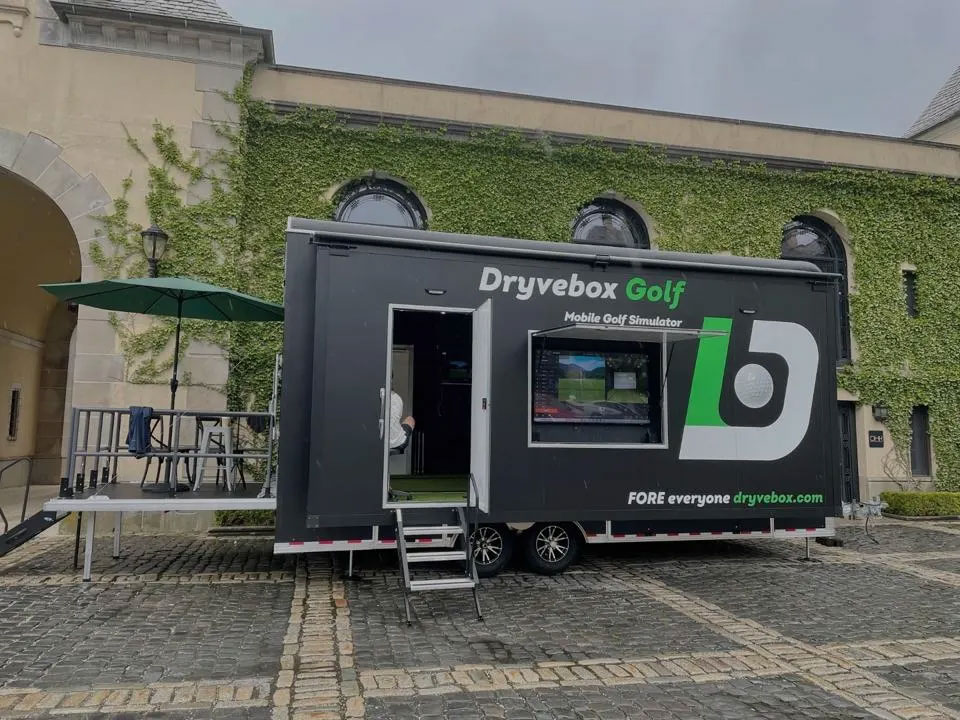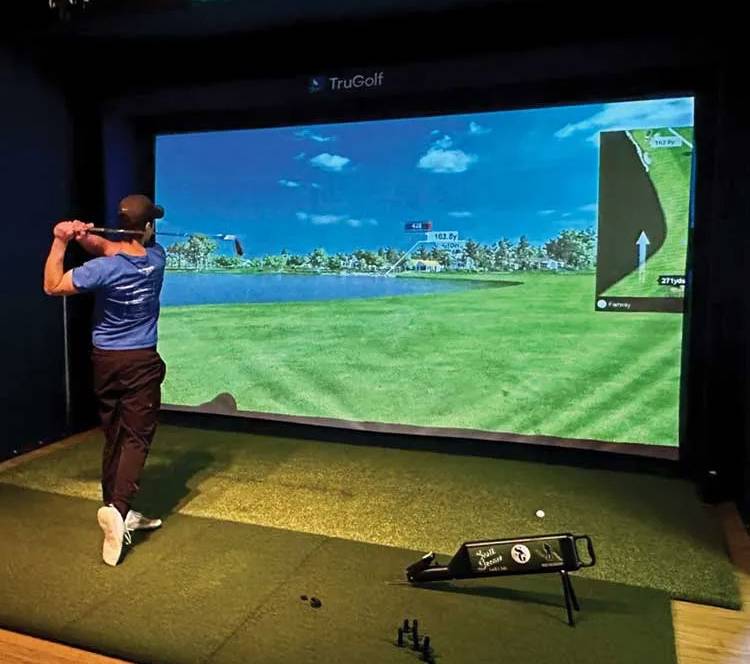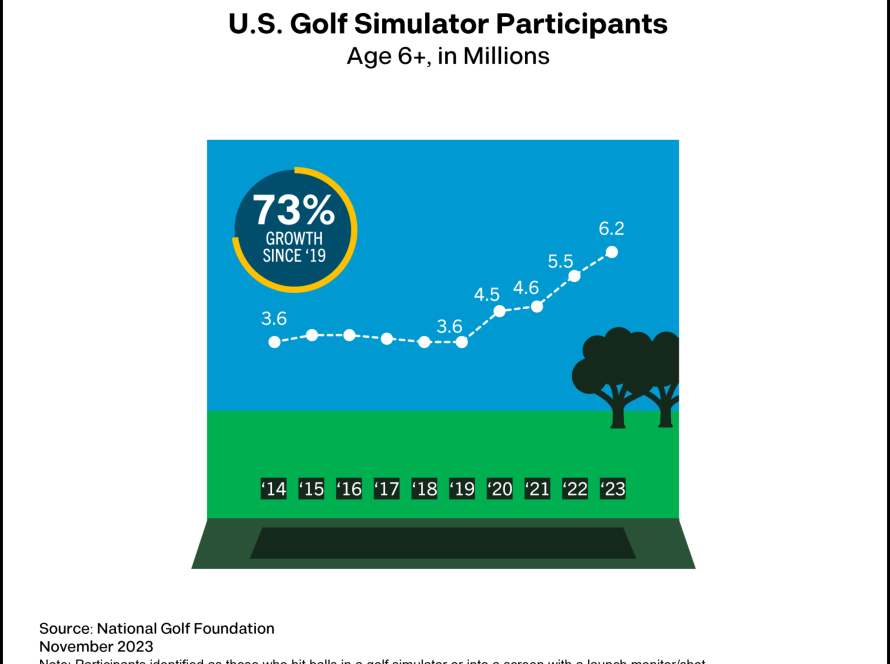Passive media rooms in the home are passe. Interactive alternatives, like golf simulators that can double as entertainment venues for avid golfers or the whole family, are hot.
Especially in recent years.
Not only has the pandemic shifted people’s priorities, but new technologies and businesses have emerged that are making golf simulators an increasingly popular residential add – in basements, garages, standalone rooms, sheds, and beyond. And a variety of packages, setups and offerings coupled with a lower cost to entry have made home simulators realistic for a much wider consumer base.
“These ‘after-Covid’ years have just seen exceptional growth,” said Jeff Wood, VP of Brand Marketing & Customer Experience for The Indoor Golf Shop, which has seen a 150% increase in its business since 2020 and has expanded manufacturing capabilities as a result. “There was this massive wave coming out of that timeframe. 2021 and 2022 were just crazy. This year is kind of normalized, but we’re seeing continued growth.”
“There’s been a lot of new entrants – companies that have come in (the business) in the past few years,” Wood added. “From a golf population standpoint, we know there is great interest in indoor golf and we are absolutely experiencing that.”

An estimated 6.2 million Americans hit golf balls with a club in a golf simulator within the past year, a total that’s jumped 73% compared to pre-pandemic levels, according to a new report from the National Golf Foundation. For comparison purposes, that’s about equal to the total population of Phoenix, Philadelphia, San Diego and Dallas – combined.
The figures account for the growing home simulator market as well as commercial simulator venues – from an expanding assortment of national franchises like Topgolf Swing Suites, Five Iron Golf and X-Golf to regional locations like Play-a-Round Golf in the Philadelphia area.
An increasing number of green grass golf facilities are embracing simulators as a value-add, too, offering more customer and member engagement during the offseason or after the sun goes down. Simulators are commonplace in instructional venues and golf retail stores, and popping up with greater frequency in a wider variety of locations: bars and restaurants, casinos, stadiums, hotels, on cruise ships, and more thanks to a range of suppliers such as aboutGolf, Foresight Sports, Full Swing Golf, Rain or Shine Golf, Rapsodo, SkyTrak and Trackman.
“The golf sim market has really opened up the past few years. From the boom of commercial locations to the accessibility of personal launch monitors, people are coming to learn about the benefits of simulator golf.” said SkyTrak CEO Jeff Foster. “We’re excited for what’s to come and how we can continue to help people get better.”
Golfzon, which has a massive commercial simulator presence in South Korea, doing almost 90 million 18-hole rounds annually at its 5,000+ locations, is among those seeking to expand in the North American market. Golfzon America partnered with Troon, the world’s leading management company, to launch state-of-the-art indoor golf entertainment venues called Golfzon Social that have the company’s most advanced simulators.
“While golf is at the core of Golfzon Social, the facilities cater to everyone who is looking for a fun and relaxing time, regardless of their prowess on the course,” says Golfzon America CEO Tommy Lim. “We’ve removed the stressful elements that beginners might feel at a traditional golf course, making them comfortable and more likely to embrace the sport.”

With an energetic sports bar atmosphere and extensive food and beverage options, the Golfzon Social product is a notable departure from Golfzon venues in South Korea, which put greater focus on playing simulated full rounds of golf.
There’s been a wave of new product releases in the home simulator and launch monitor category as well, including Golfzon’s portable technology (actually called “Wave”) that retails for about $4,000. SkyTrak’s full solution simulator package is on sale for just under $6,000.
Full Swing, which counts Tiger Woods and Jon Rahm among its endorsers, recently unveiled an all-in-one package called Full Swing KIT Studio starting at $9,500 that offers a launch monitor and software to pair with a screen enclosure or net and turf package. Full Swing was poised for even more national attention as the technology provider of the new indoor primetime golf league TGL, but the team concept that was set to debut in January 2024 has been pushed back a year.

Even so, indoor simulators are still enjoying their proverbial moment in the sun.
They address three of the biggest limitations for green grass demand: weather and seasonality, no nighttime play, and a lack of tee time availability. In the home market, the chief selling point on top of all that is convenience.
Companies like The Indoor Golf Shop are able to guide consumers through what can be an intimidating process, sharing options for components from a variety of technology providers, and potential fits for a customer’s particular space and budget.
“Where the growth in this part of the industry has really exploded is that affordability, the ability to kind of build it on your own, and to put it into spaces that a lot of people can make work,” said Wood. “In the past, it had to be a full-blown kind of custom build into the home where now it’s a lot of garages, a lot of multi-use flex spaces, or media rooms that have gone unused.”
And for those who might not have the space but want the convenience, there are companies that bring the golf simulator to you.
Dryvebox is among those seeking to break open the mobile golf category, with simulators in trailers that provide a golf entertainment experience at parties, tradeshows, conferences, and corporate and private events. The company launched in 2021 and has expanded from four trailers to 15 over the past year while serving a quarter of a million golfers (and non-golfers). Now in 10 cities, Dryvebox also offers marketing activations, a consumer membership model with units parked in easily accessible locations, and private or facility coaching studios.

“The opportunity is enormous,” said Dryvebox co-founder and CEO Adeel Yang, who didn’t take up golf until shortly before the pandemic, became obsessed and soon realized giving up a room for a simulator in the tight confines of his San Francisco home wasn’t a realistic option.
“In addition to filling a gap in the market, we also liked the business because of the more flexible, and generally lower, operating costs versus a traditional brick and mortar golf business,” added Yang. “We started offering franchises so we could partner with people who have the same vision and so collectively we could get more units out faster.”
As technology continues to improve and become less expensive, golf simulators are only going to become more ubiquitous. And their increasing availability and popularity will likely help further drive participation numbers — off and on the golf course.

